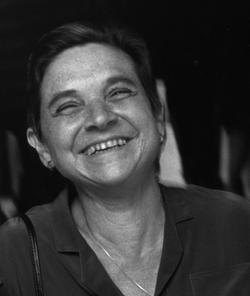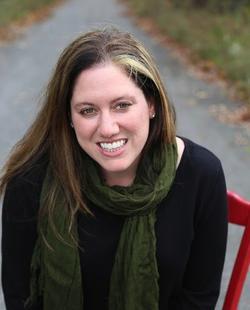Feminist Poets
“To me, Adrienne Rich is an inextricable part of the matriarchy of Jewish poets—alongside Grace Paley, Marge Piercy, Chana Bloch, Alicia Ostriker, and many others—who speak truth to power in verse, and engage in struggles for social justice and emotional honesty. They teach us, over and over, that our stories and words have worth, and that our work is never finished.” —Erika Meitner, as told to JWA
In 1969—the same year that Carol Hanisch published her essay “The Personal Is Political” and Vivian Gornick’s article on the advent of radical feminism “The Next Great Moment in History Is Theirs” appeared in the Village Voice—Adrienne Rich wrote the poem “Pieces,” which lamented that “this world gives no room / to be what we dreamt of being.” Born in 1929 into a world that forcefully suppressed the transgressions she would eventually embrace, Rich would spend her life making room with her words.
Long before she was a famous poet and public intellectual, Adrienne Rich was a young wife and mother. She raised three boys while writing and publishing. When she became involved in politics, hosting Black Panther meetings in the living room, her husband thought she’d lost her mind. Rich’s experience of motherhood, and of the midcentury oppression of nuclear family life, reads like a chapter out of The Feminine Mystique. It can be difficult to connect this part of her story to the image of Rich as a powerful figure, the Jewish lesbian radical feminist with the close-cropped dark hair, an icon speaking truth to power with an unwavering voice. But between cooking meals and changing diapers, she was beginning to write poems that combined formal experimentation with her increasing disquiet in her restricted female role.
In 1963 Rich published Snapshots of a Daughter-in-Law, which was condemned by critics as being “too personal”—at a time when personal was, for women writers, the wrong thing to be. In her poetry, and in her 1975 book Of Woman Born, she explored her experience of motherhood as both a joy and an institution used to deny the mother the right to be “the presiding genius of her own body.” She began writing extensively about lesbian sexuality and her own sexuality in the late 1970s in a culture devoid of meaningful discussion about middle-aged women’s sexuality and same-sex relationships. Rich opened the doors for countless women poets to write intimately from their own points of view. Her poetry declared women’s experience to be meaningful and worthwhile. She cleared the path for young women like Erika Meitner to write deeply personal poetry about anything they desired, including the seemingly mundane, everyday experience of being women.
Adrienne Rich will always be famous for her poems, her politics, her many awards—including those she refused—and her powerful statements against patriarchal and heteronormative oppression. She should also be remembered for embodying the woman coming of age in the 1950s, the woman who wanted more. Rich was 40 when she wrote that “this world gives no room / to be what we dreamt of being.” By the time she died at 82, she had remade that world.
When asked about her literary relationship to Adrienne Rich, Erika Meitner immediately has a story to tell: “Recently,” she said, “a poet-friend was gathering examples of how poetry can truly save us. I sent her a copy of Rich's poem ‘Tattered Kaddish,’ a poem that has moved me through immeasurable loss: “Praise to life through ones we knew and loved / loved it badly, too well, and not enough.”" Meitner’s connection to Rich’s body of work is more than the love of a reader: her poems read as the natural progression of Rich’s, a passing of the torch from one generation to the next. Meitner writes, urgently and movingly, on the subjects that Rich fought to win respect for: womanhood and motherhood, women’s history, Judaism, and intersectional identity.
Meitner first came across Adrienne Rich’s poetry in college, “in a tattered copy of A. Poulin Jr.'s Contemporary American Poetry.” “Diving into the Wreck,” one of Rich’s most widely taught and anthologized poems, quickly became “a touchstone and rallying cry” for Meitner—an outspoken feminist on the very male-dominated campus of Dartmouth College in the early 1990s. Says Meitner, “I was determined to help make Dartmouth into a place where women felt comfortable, equal, and empowered, and Rich's poem gave me a language and a template.” She made good on her goal by becoming editor of the campus feminist newspaper, Spare Rib, and found herself straying from her pre-med coursework into poetry classes, which would provide her with the tools to elevate her experiences and ideas into art.
Meitner has published four award-winning volumes of poetry, and while each is unique, the threads of feminism, Judaism, and women’s stories run through all of them. In “1944,” she writes. “My grandmother made / holes in hand grenades / to leave Bergen Belsen . . . What would you place / in her outstretched hands?” Meitner's foremothers, including one grandmother who survived the concentration camps and another who immigrated to Palestine to escape the Nazis, turn up time and again in her writing. But her poems are also peppered with the more mundane experiences of her 21st century life: Burger King and Walmart, pregnancy, love, babies with fevers, and neon-lit small-town America.
In an age when anyone can share their stories online, Meitner’s poetry heightens such stories to art—something often lost in the bustle of blogs and tweets. For Adrienne Rich, speaking truth to power meant literally using her truth to break down the power structures that oppressed women. Erika Meitner finds power in recognizing that poetry is a vital, still-relevant vehicle for women’s experience—that, just as Rich demonstrated before her, “our stories and words have worth.”




